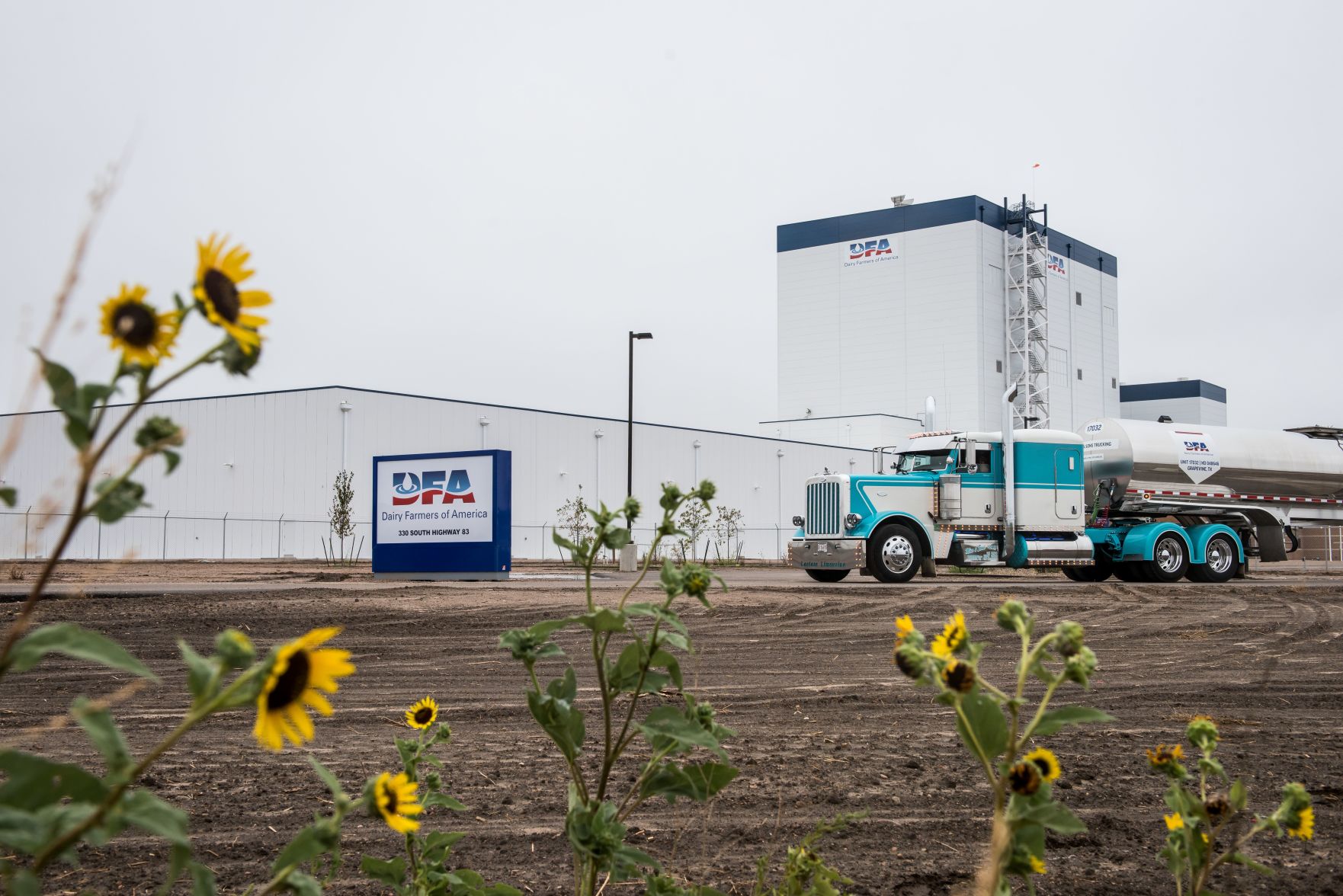Workers at Dairy Farmers of America’s state-of-the-art milk ingredients plant in Garden City, Kansas, have the process of turning 80 truck loads of milk into 10 to 12 loads of milk powder down to a science.
Michael Lichte, vice president and general manager, dairy powder ingredients at DFA, said this daily process is no easy feat.
“It is a milk drying facility, where we will bring in milk from our local dairy farms there and basically go through a few different manufacturing processes that will take the super majority of the water out of the milk,” Lichte said.
From the moment a tanker truck enters the plant it takes about 68 minutes to off-load milk, clean the truck and test the milk. A tanker can return to the dairy the same day, now that the plant is so close to area dairy farms.
Once all the water is removed from the milk, it’s packaged into 25 kilogram industrial bags or 2,000-pound totes to be shipped out to secondary processors, which add the dry milk to their own products.
“(Secondary processors) will basically take that product and then put it into a liquid beverage, ice cream, chocolate or nutrition products,” he said.
Helping more than just the local dairies
The plant reclaims what Lichte calls a “decent” amount of water from the drying process, about half. Water is cleaned to the point where it is almost potable, he added. The plant has partnered with the local community to develop uses for the water, including for irrigation purposes in the local municipality, Lichte said.
“For high plains dairies, water is liquid gold,” Lichte said. “It’s a great opportunity for us to hopefully help sustain the aquifer a little bit longer, or at least do our part to help out our community.”
The plant opened in the fall of 2017, and has since received the Sustainable Plant of the Year Award from Food Engineering magazine. The award honors a newly constructed food facility focused on reducing, reusing and recycling. The significance of being recognized for their sustainability is two-fold, Lichte said.
“With the factory itself, the whole ability to reclaim the water and partner up the local community to have that irrigation capability, is another big piece of that sustainability circle we had,” he said.
The second part of the plant being sustainable is it provided local dairy producers a place to market their milk. Most of the dairies are within a 75- to 100-mile radius.
“They were trucking their milk at least 200 miles every day, if not going further distances just to find a market to sell their milk to,” he said.
And the plant is a farmer-owned cooperative, which is a partnership between DFA and 12 of its member farms in southwest Kansas. This helps dairy farmers in the area for a few reasons.
“From a producer standpoint I think it helps provide stability for their farm assets,” Lichte said. “They now have that local market to sell their milk to—a local plant they can sell to every day.”
This gives the farms stability for both owners and employees, in addition to stability in Garden City.
“With the greater reach we have now, hopefully they see it as another high quality employer that local citizens want to work in, but hopefully if they see us as a good steward for trying to provide food and agriculture in that local market place,” he said.
Sign up for HPJ Insights
Our weekly newsletter delivers the latest news straight to your inbox including breaking news, our exclusive columns and much more.
Even with the tough times facing the dairy industry, Lichte reminds milk prices are cyclical, like cattle, corn or hogs.
“We’re at a place where the milk prices paid to the dairy producers across the world are down relative to the 5 or 10 year average price,” he said. “So these producers would be no different than other producers across the country. They are impacted by less value in their milk check each month.”
Market for milk
There are a variety of applications for milk powder and it is used worldwide. Currently, DFA is serving customers in the United States, Latin America and Asia. The plant produces whole and skim milk powder, nonfat dry milk powder and cream, and receives approximately 4 million pounds of milk a day from regional farms.
“Even though this factory is in the middle part of the United States we see it as a great supply point for us to help grow our Asian strategy, which is the growing market for U.S. dairy products,” he said. “No different than Latin America.”
It’s vital for the products the Garden City plant produces to serve global markets.
“It’s always going to be important to U.S. producers, but for us to continue grow our ability to produce milk locally, I’ll find some more foreign consumers that demand the product,” Lichte said.
Kylene Scott can be reached at 620-227-1804 or [email protected].



